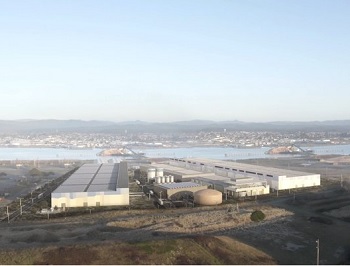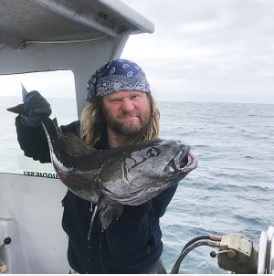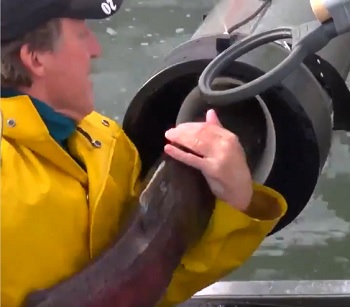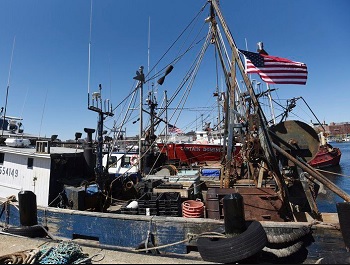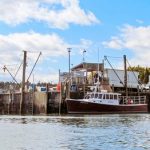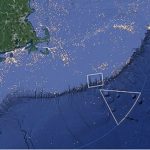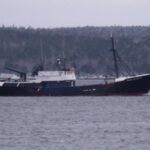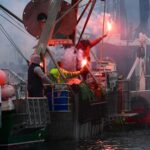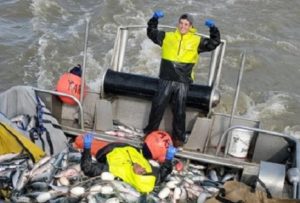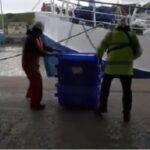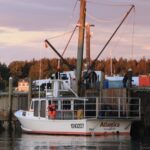Monthly Archives: April 2020
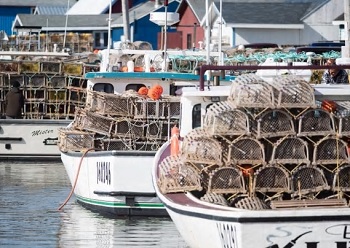
Canadian Independent Fish Harvesters Federation calling on Ottawa for Coronavirus aid
The Canadian Independent Fish Harvesters Federation says the federal government needs to do more to help people who work on the water sooner rather than later, amid the COVID-19 pandemic. The federation represents fishing groups from across the country, including the P.E.I. Fishermen’s Association. “The time for some assistance that we heard the minister speak about is now,” said Melanie Sonnenberg, president of the federation. Earlier this week, federal Minister of Fisheries Bernadette Jordan announced Ottawa’s plan to help processors during the pandemic and said the federal government is working on help for fishermen. >click to read< 14:53
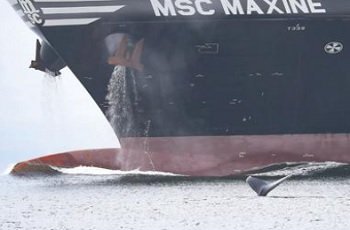
Humpback whales, large ships on deadly collision course at the mouth of Chesapeake Bay
Attracted by a relative abundance of fish, growing numbers of humpback whales spend the winter in the waters where the Chesapeake Bay empties into the Atlantic Ocean. No. 166675 was one of them. Researchers tracked the young male with a satellite tag for 10 days in January 2017 as he dodged huge vessels in one of the busiest shipping lanes on the East Coast. The next month, the whale’s body washed ashore on Virginia Beach. A necropsy confirmed the scientists’ fears: He had been struck by a large ship. After six years of monitoring humpbacks’ movements in the Hampton Roads region, the team conducting the Navy-funded study has published its first peer-reviewed paper. It shows that many more humpbacks are at risk from ship strikes and suggests that authorities may need to take more actions to protect them. >click to read< 13:45
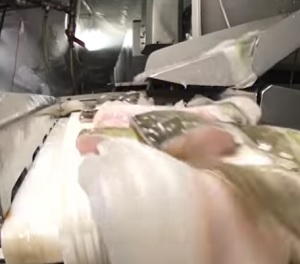
America’s Food Distribution Chain Is Essential
The disruptions in the food supply chains can be attributed to two primary causes – outbreaks of Coronavirus at some meat-processing and other food-packaging plants have led to closures across the country, and meanwhile, the sweeping closures of restaurants by state and local governments have disrupted the demand for a wide variety of food items. Over the past few days, fifteen percent of the pork processors have closed their doors. America’s fish supply provides a powerful example of what happens when states unilaterally shutter dine-in services at restaurants. The fishing industry knows something the central planners seem not to have known: Americans have a strong preference for eating fish in restaurants, rather than cooking it. >click to read<
Meat processing plants across the US are closing due to the pandemic. Will consumers feel the impact? – video, >click to read< 11:56
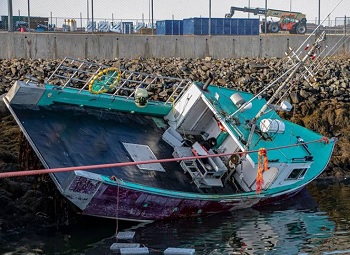
RCMP seek public’s help in arson and mischief investigation
Yarmouth RCMP are asking for the public’s help in identifying two persons of interest in relation to an arson and mischief,, Just after 1 a.m. on Saturday, RCMP responded to a truck fire at a wharf on Water Street in Yarmouth. In a news release Wednesday, RCMP said their investigation has revealed that the truck was deliberately set on fire and completely destroyed. “The next day, police were made aware of a nearby fishing boat from the same wharf that washed up on nearby rocks causing damage to the vessel,” the release said. “It appears as the boat’s lines to the wharf were disconnected around the same time as the arson.” photos, video, >click to read< 08:22
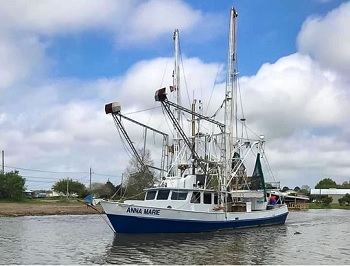
‘Another punch in the gut’: Gulf Coast shrimpers navigate the coronavirus crisis
Shrimping is a hard business. Gulf Coast shrimpers, who bring in three quarters of the nation’s catch, have been battered with waves of bad luck. Hurricanes. A flood of cheap imports. The BP Deepwater Horizon oil spill in 2010. Fresh water diversions that kill seafood. And now the coronavirus. Restaurants buy 80% of both imported and domestic shrimp, according to the Southern Shrimp Alliance. With restaurants closed or offering only takeout, no one is buying much shrimp. Next month would typically launch the peak of shrimp season as Gulf states begin their annual opening of nearshore waters to shrimping. >click to read< 07:45
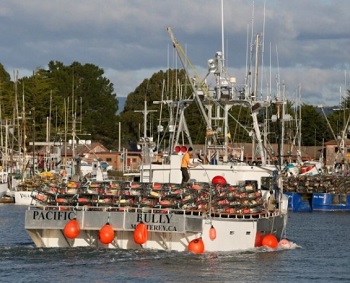
Crab fishing industry not canceled yet, but,,,
Humboldt County’s crab fishing season will remain open for now, unlike fisheries south of the Sonoma and Mendocino counties line, which have been ordered to close on May 15. An ongoing settlement agreement allows the season to be ordered closed when there’s too high a risk of whales becoming entangled in fishing gear. For now, the North Coast has been spared of closure, though a recent report from the National Oceanic and Atmospheric Administration flags one humpback whale, which beached at Samoa in October 2019. The whale later died. Overall, the report indicates California had 17 whale entanglements in 2019, down from 34 the year before. >click to read< 21:46
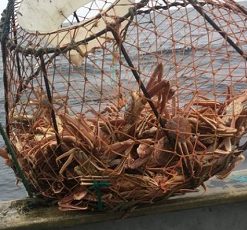
FFAW, processors remain at odds on opening Newfoundland and Labrador crab season
It remains to be seen whether harvesters in the province will eventually start fishing for crab and offloading it at plants for processing. According to the Fish, Food and Allied Workers (FFAW-Unifor), two vessels from outside the province were turned away in Port Aux Basques and denied the opportunity to offload crab as of Monday morning, and three transport trucks carrying crab harvested outside the province were being blocked from making deliveries to fish plants, two in South Brook and one at Goobies. “The fishery was postponed three times on health and safety issues,” Pretty said. “During that time, the bargaining for the price of crab should have progressed, but instead of progressing,,, >click to read< 19:46
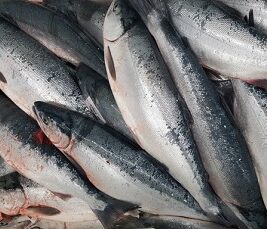
With coronavirus pandemic procedures in place, Copper River salmon season ready to open
Hundreds of vessels and workers flood into Prince William Sound each May for a chance to harvest the first fresh wild king salmon of the year, followed by the famous Copper River sockeye and the broader Prince William Sound pink salmon fisheries. However, with limited road access and health care facilities, city and state officials have been coordinating with the fleet and stakeholders about how to safely allow in deckhands, captains, and processing workers from Outside without inviting the pandemic to Cordova as well. “Fishermen are very concerned and have been concerned since day one,” said Francis Leach, the executive director of the United Fishermen of Alaska. “Now that procedures have been put in place, there are a lot of questions. It’s always a learning curve. Folks are really going to have to pay attention to (the mandate).” >click to read< 14:36
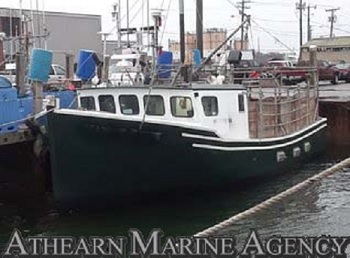
Athearn Marine Agency Boat of the Week: 45′ x 17′ Novi Gillnetter, 375HP John Deere, permits available
To review specifications, information and 43 photos, >click here< Vessel is in good condition. To see all the boats in this series, >click here< 12:13
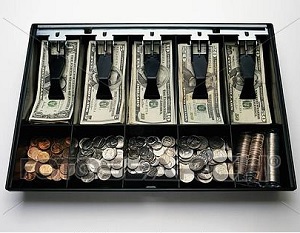
Alaska: Reopening of state economy begins
Restaurants, shops and hair salons around Alaska are beginning a cautious reopening under strict state mandates as Alaska works to inhibit the spread of COVID-19, while the economic reopening remains on hold in Cordova. Emergency order 2020-05, issued by City Manager Helen Howarth, reinstates business restrictions lifted by the state on April 24 until May 20. Independent commercial fishermen meanwhile now have their COVID-19 marching orders from state officials, a list of protective measures, procedures, travel and access measures they must abide by, as the influx of seafood workers begins in Cordova. >click to read< 10:25
Strict new pandemic rules are in place for Alaska fishermen and their vessels – >click to read<
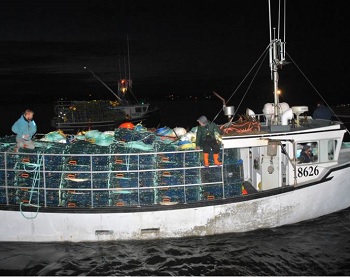
Letter of the Day: Respect the vote and let open LFA 24 on May 6
I am here to talk about our concerns about the delay in our lobster fishery to May 15th. We the fishers of Lobster Area 24 voted in favor of going fishing on May 6. This was a legal vote; we cannot understand how a federal minister of fisheries can open areas in her own riding and province but close fishing zones in other provinces for no reason. Years ago, when we had issues with delays, there were votes held when fishers wanted to go. Those votes were respected by the minister of fisheries at that time. >click to read< 08:28
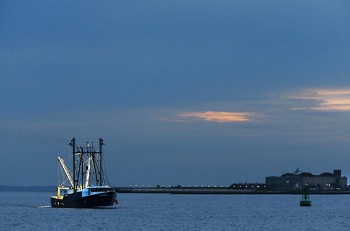
Coronavirus: Seafood prices have dropped, but New Bedford fishermen still fish amid pandemic
“We’re still going out, everything’s running right along for us,” groundfisherman Antonio Cravo and co-owner of F/V United States said on Monday. Cravo, who is based in New Bedford, said the prices have dropped and he’s getting less money for the fish he catches, but it’s still worth going out on trips. “We offloaded last night and just got paid today, the prices dropped, but it’s still worth it to keep going,” Cravo said,“We still get a paycheck, not as much, but we still get a paycheck to keep up with our bills.” The price of scallops is also holding steady, according to scalloper Eric Hansen. “I wouldn’t say [the prices] are great, but they’re steady,” Hansen said. >click to read< 07:25
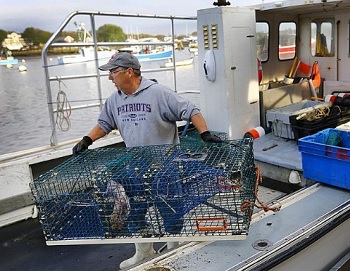
Right whale sighting pushes back start of South Shore lobster season
Lobster season in southern Massachusetts has been put off for an additional seven days after endangered right whales were spotted feeding in the southern Cape Cod Bay. The Division of Marine Fisheries announced Tuesday that most of Cape Cod Bay and the Outer Cape will remain closed to lobster fishing until May 8. The area is is closed annually from February to the end of April to protect right whales. It was initially set to open on Friday. The lobstering season on the South Shore is limited by the season and by the lobster’s life cycle. They shed their shells in June and are not active again until mid-July, John Haviland, president of the South Shore Lobster Fishermen’s Association, said. The bay closures started six years ago and increased the length of time lobstermen are out of the water. Before the closures,,, >click to read< 18:18
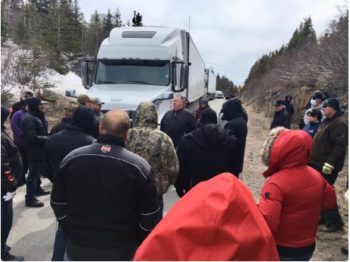
Crab trucks roll toward Triton after confrontation in South Brook – Crab fishery delayed until at least May 11
By noon on Tuesday, the trucks began to roll toward the fish plant, but were being slowed by protesters. RCMP were on hand ticketing the drivers who were interfering with their progress. >click to read< 16:56
Crab fishery delayed until at least May 11, following days of protests – After two days of protests by fish harvesters, the snow crab fishery in Newfoundland and Labrador has been delayed until at least May 11. DFO issued a media release at 5 p.m. Tuesday saying the exact start of the season has not yet been determined. That delay comes after several days of protests in several different locations in the province. The protests started late Sunday in Port aux Basques when the Fish, Food & Allied Workers union, which represents fish harvesters, learned snow crab was being brought in from outside the province to be processed. Late Tuesday afternoon, two transport trucks were able to offload crab,, >click to read< 17:03
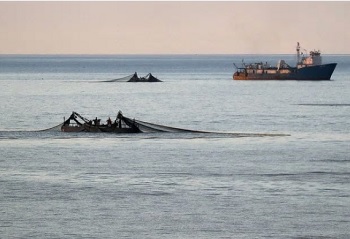
Chesapeake Bay’s menhaden catch cut drastically, along with Omega Protein quota
Virginia is cutting this year’s Chesapeake Bay menhaden catch by more than 80% from last year’s landings in order to end a federal moratorium.
Federal fisheries officials said they’d bar fishing for menhaden in the Bay this year — as long as the fish were headed for Omega Protein’s fish oil and fishmeal plant in Reedville — because the state had not enacted a 41.5% cut to 51,000 tons in Omega’s quota, which had been imposed by the Atlantic States Marine Fisheries Commission in 2017. But the Atlantic States commission has not found that menhaden were overfished. “To be perfectly clear, there is no conservation basis for the Chesapeake Bay cap. No scientific methodology was used in setting the Chesapeake Bay cap by the ASMFC, ,,, >click to read< 15:35
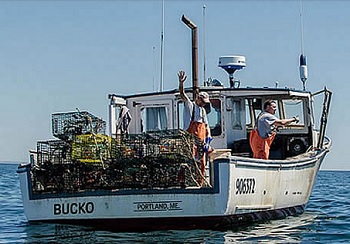
Maine Department of Labor to Accept Unemployment Applications from Self Employed and Others 8 a.m. May 1
The Maine Department of Labor will begin accepting applications for the new Pandemic Unemployment Assistance (PUA) at 8 a.m. Friday, May 1. People whose claim does not require further review should begin receiving benefits within seven days of filing. Pandemic Unemployment Assistance is a new federal program which expanded eligibility for unemployment benefits to certain categories of workers not typically able to receive unemployment in the past, such as: ,Self-employed workers ,Farmers/Fishermen, Independent contractors, Nonprofit employees not already covered by regular state unemployment benefits, Gig economy workers, Workers who do not have enough work history and earnings to be eligible for traditional unemployment benefits, Others who have been determined ineligible for regular unemployment benefits. >click for links, and more information< 14:10

What’s that? Alaska fishing boats to fly quarantine flag
The “Lima flag” is not something most of them have probably ever seen in person. And the requirement is only if they or their crew members are coming from out of state. If they have a crew member who needs to self-quarantine on board for any reason, that yellow and black flag (or maybe a Pittsburgh Steeler’s sweatshirt, if no quarantine flag is to be found) has to go up the mast to warn people to stay away for 14 days. The details of how independent fishing vessels will have to protect coastal communities from incoming coronavirus contamination are laid out in Health Mandate 17,,, >click to read< 08:50
Commercial fishing vessels get COVID-19 mandates – Independent commercial fishermen got their COVID-19 marching orders from state officials Thursday, April 23, a list of protective measures, procedures, travel and access measures they must abide to protect themselves and coastal communities. >click to read< 10:48
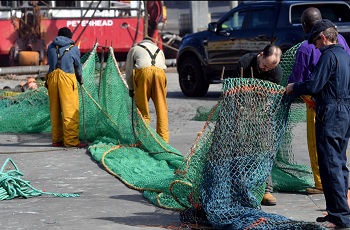
The Silent War on Fishing
The hustle and bustle of Peterhead’s harbour has quietened these last few weeks. Doors of businesses are locked and boats at berth have signs warning that no one will be permitted on board because of new safety measures. Its fish market continues to operate, however, in what is becoming a new normal. While it once welcomed tourists and eager locals alike, it now restricts access to only key workers in order to protect stakeholders. It’s a familiar story across all ports in Scotland. They are steps that have been introduced to help the country battle COVID-19, but it has had an inevitable impact on the market. >click to read< 08:07
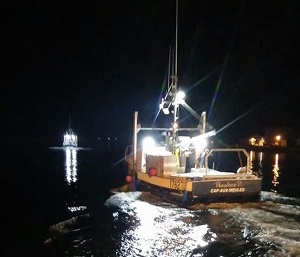
OCI granted injunction as fishermen block out-of-province crab
The Supreme Court of Newfoundland and Labrador has granted Ocean Choice International an injunction ending the Fish, Food & Allied Workers union’s blockade on the highway near South Brook. The injunction prohibits FFAW members from blocking the route to OCI’s processing plant in Triton or interfering with customers or contractors entering the property. It’s the latest development in an argument between the union and Association of Seafood Producers over whether the fishery should be up and running during the COVID-19 pandemic. Union members blocked two fishing vessels from the Magdalen Islands from offloading crab in Port aux Basques on Sunday evening. >click to read< Protesters Who Blocked Out-of-Province Crab Shipment Facing Court Injunction, tweets, >click to read< 18:04
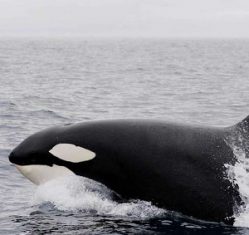
Trollers side with NMFS in Chinook litigation – Endangered whales compete with increasing populations of seals, sea lions
Litigation to halt the Southeast Alaska king salmon fishery to provide sustenance for Southern Resident Killer Whales is prompting commercial trollers to intervene in the lawsuit brought by the Washington state based Wild Fish Conservancy. The Alaska Trollers Association in Juneau voted on Tuesday, April 21, to insert itself into the defense of the lawsuit filed in mid-March against the National Marine Fisheries Service and the subsequent injunction against king salmon fishing and the troll fishery specifically. >click to read< 15:41
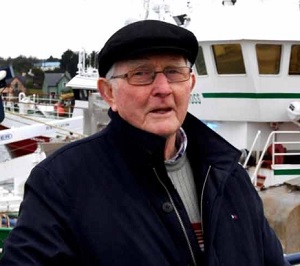
Tributes paid to fishing industry leader Donal O’Driscoll – A champion of the Irish fishing industry
“A champion of the Irish fishing industry” is how the Irish South and West Fish Producers’ Organisation (IS&WFPO) described him yesterday (sun), as plans were made for a guard of honour in his home port of Castletownbere, Co Cork today. The RNLI Castletownbere lifeboat station, Castletownbere Fishermen’s Co-op and the IS&WFPO are among organisations which Mr O’Driscoll was instrumental in founding. Mr O’Driscoll was one of a family of 14 and was born on Sherkin island in 1933. He learned his first fishing techniques – seining for mackerel – from his father, Dan William O’Driscoll. >click to read< 14:10
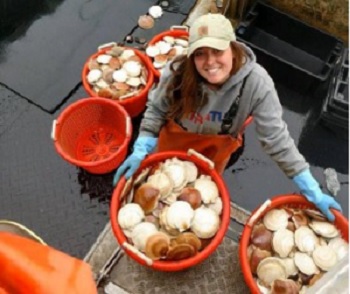
For NH’s food producers, Coronavirus sends a very mixed message
Across New Hampshire, the demand for local food is up, even as restaurants have closed or have tried to get by with takeout. The state’s small farmers are finding an unexpected benefit in the Covid-19 pandemic – there is an increased demand for their locally grown meats, vegetables, dairy, and other products.,, And for the Vernons and others, business is thriving. Demand for fish Kayla Cox, manager of New England Fishmongers, said the company’s business model for the past couple of years has been to sell directly to consumers – no wholesale. “What has changed drastically is that home delivery has completely blown up. It’s almost out of control,” Cox said. “We were doing 15 to 20 deliveries a week, and this past week we did 170. >click to read< 13:04
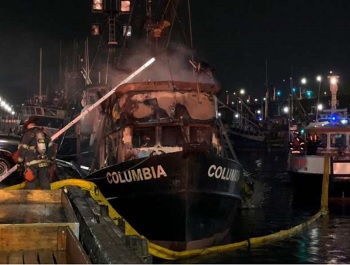
Boat sustains heavy damage as it burns along Fishermen’s Terminal
A large boat at Seattle’s Fishermen’s Terminal suffered severe damage during a large fire on board Sunday evening. The fire broke out just after 10 p.m. and flames were visible shooting from the top deck as far away as an SDOT camera at 15th Ave. West and West Emerson Street. >click to read< 11:21 Fire damages boat near Fishermen’s Terminal – No injuries were reported. The cause of the fire is under investigation. photo, >click to read<
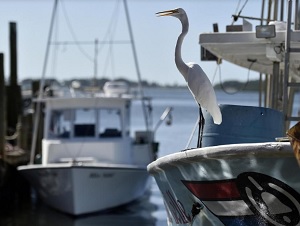
Coronavirus Florida: Cortez fish company staying afloat
Fishing boats are still leaving the docks in Cortez, but coronavirus has changed the specifics of where the hauls wind up. Karen Bell, president of A.P. Bell Fish Co., said “we’re holding our own” when asked about the impact the virus has had on the fish house she owns in the historic village of Cortez that sends seafood all over the world. Business is far from brisk, but demand is still there, even if the target has been altered. “It (the virus) shifted everything around,” Bell said. “People are still eating but they’ve changed how and where they eat.” Of the fish being unloaded now, 60% are coming from inshore, 40% offshore, Bell said. Before the virus upended the economy, it was the other way around. >click to read< 10:20
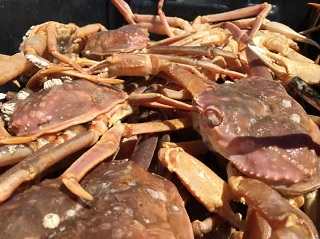
Coronavirus: Fishermen block out-of-province crab shipments heading for N.L. fish plants
It’s the latest development in an argument with the Association for Seafood Producers over whether or not the fishery should be up and running during the COVID-19 pandemic. The Fish, Food and Allied Workers union (FFAW) says its members do not want to go to work on boats or in plants until their safety is assured. “Fish harvesters are mobilizing around the province to block out-of-province crab from landing in Newfoundland and Labrador for processing,” said a statement sent by the FFAW on Sunday night. “Harvesters and plant workers are calling on the provincial government to step in and for companies to respect N.L. workers.” >click to read< 07:40
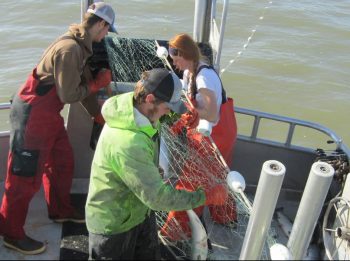
How one fisherman brings his wild salmon catch from Alaska to Missouri
Sean Guffey was studying communications at the University of Michigan when he drove to Alaska during the Exxon Valdez oil spill. Soon, he was on a fishing boat with scientists studying the impact of the spill. As he watched, Guffey learned from their observations and concerns about wildlife. Every year since, he has found his way back to Alaska. Today, he is the captain of Watermen, a boat docked in Bristol Bay. And every summer, he catches wild sockeye salmon and brings it back to Missouri to sell. photos, >click to read< 17:22






